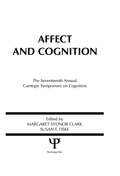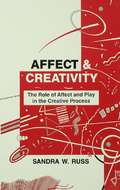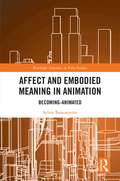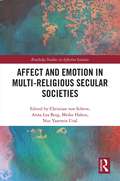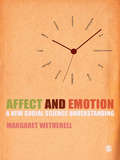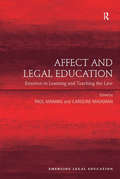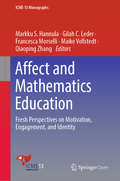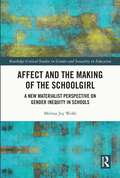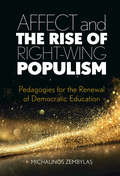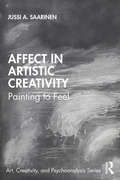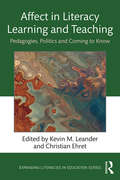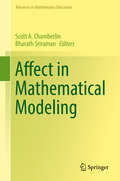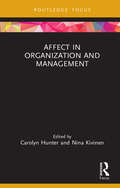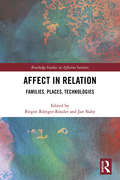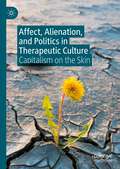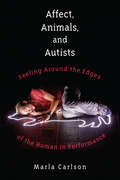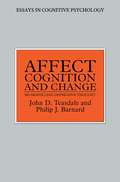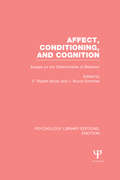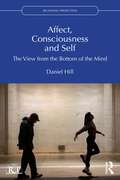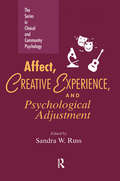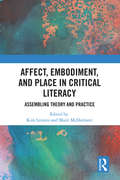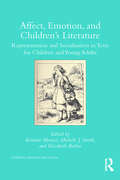- Table View
- List View
Affect and Cognition: 17th Annual Carnegie Mellon Symposium on Cognition (Carnegie Mellon Symposia on Cognition Series)
by Susan T. Fiske Margaret Sydnor ClarkFirst published in 1982. Routledge is an imprint of Taylor & Francis, an informa company.
Affect and Creativity: the Role of Affect and Play in the Creative Process (Personality Assessment Series)
by Sandra Walker RussMuch work has been done on cognitive processes and creativity, but there is another half to the picture of creativity -- the affect half. This book addresses that other half by synthesizing the information that exists about affect and creativity and presenting a new model of the role of affect in the creative process. Current information comes from disparate literatures, research traditions, and theoretical approaches. There is a need in the field for a comprehensive framework for understanding and investigating the role of affect in creativity. The model presented here spells out connections between specific affective and cognitive processes important in creativity, and personality traits associated with creativity. Identifying common findings and themes in a variety of research studies and descriptions of the creative process, this book integrates child and adult research and the classic psychoanalytic approach to creativity with contemporary social and cognitive psychology. In so doing, it addresses two major questions: * Is affect an important part of the creative process? * If it is, then how is affect involved in creative thinking? In addition, Russ presents her own research program in the area of affect and creativity, and introduces The Affect in Play Scale -- a method of measuring affective expression in children's play -- which can be useful in child psychotherapy and creativity research. Current issues in the creativity area are also discussed, such as artistic versus scientific creativity, adjustment and the creative process, the role of computers in learning about creativity, gender differences in the creative process, and enhancing creativity in home, school, and work settings. Finally, Russ points to future research issues and directions, and discusses alternative research paradigms such as mood-induction methods versus children's play procedures.
Affect and Embodied Meaning in Animation: Becoming-Animated (Routledge Advances in Film Studies)
by Sylvie BissonnetteThis book combines insights from the humanities and modern neuroscience to explore the contribution of affect and embodiment on meaning-making in case studies from animation, video games, and virtual worlds. As we interact more and more with animated characters and avatars in everyday media consumption, it has become vital to investigate the ways that animated environments influence our perception of the liberal humanist subject. This book is the first to apply recent research on the application of the embodied mind thesis to our understanding of embodied engagement with nonhumans and cyborgs in animated media, analyzing works by Émile Cohl, Hayao Miyazaki, Tim Burton, Norman McLaren, the Quay Brothers, Pixar, and many others. Drawing on the breakthroughs of modern brain science to argue that animated media broadens the viewer’s perceptual reach, this title offers a welcome contribution to the growing literature at the intersection of cognitive studies and film studies, with a perspective on animation that is new and original. ‘Affect and Embodied Meaning in Animation’ will be essential reading for researchers of Animation Studies, Film and Media Theory, Posthumanism, Video Games, and Digital Culture, and will provide a key insight into animation for both undergraduate and graduate students. Because of the increasing importance of visual effect cinema and video games, the book will also be of keen interest within Film Studies and Media Studies, as well as to general readers interested in scholarship in animated media.
Affect and Emotion in Multi-Religious Secular Societies (Routledge Studies in Affective Societies)
by Christian Von Scheve Anna Lea Berg Meike Haken Nur Yasemin UralEmotions have moved center stage in many contemporary debates over religious diversity and multicultural recognition. As in other contested fields, emotions are often one-sidedly discussed as quintessentially subjective and individual phenomena, neglecting their social and cultural constitution. Moreover, emotionality in these debates is frequently attributed to the religious subject alone, disregarding the affective anatomy of the secular. This volume addresses these shortcomings, bringing into conversation a variety of disciplinary perspectives on religious and secular affect and emotion. The volume emphasizes two analytical perspectives: on the one hand, chapters take an immanent perspective, focusing on subjective feelings and emotions in relation to the religious and the secular. On the other hand, chapters take a relational perspective, looking at the role of affect and emotion in how the religious and the secular constitute one another. These perspectives cut across the three main parts of the volume: the first one addressing historical intertwinements of religion and emotion, the second part emphasizing affects, emotions, and religiosity, and the third part looking at specific sensibilities of the secular. The thirteen chapters provide a well-balanced composition of theoretical, methodological, and empirical approaches to these areas of inquiry, discussing both historical and contemporary cases.
Affect and Emotion: A New Social Science Understanding
by Prof Margaret WetherellIn recent years there has been a huge surge of interest in affect and emotion. Scholars want to discover how people are moved, and understand embodied social action, feelings and passions. How do social formations 'grab' people? How do roller coasters of contempt, patriotism, hate and euphoria power public life? <P> A new social science understanding of affect and emotion is long overdue and Margaret Wetherell's voice is timely, providing a coherent and pragmatic text. It will be invaluable reading for those interested in this fascinating field across the social and behavioural sciences.
Affect and Legal Education: Emotion in Learning and Teaching the Law (Emerging Legal Education)
by Caroline Maughan Paul MahargThe place of emotion in legal education is rarely discussed or analysed, and we do not have to seek far for the reasons. The difficulty of interdisciplinary research, the technicisation of legal education itself, the view that affect is irrational and antithetical to core western ideals of rationality - all this has made the subject of emotion in legal education invisible. Yet the educational literature on emotion proves how essential it is to student learning and to the professional lives of teachers. This text, the first full-length book study of the subject, seeks to make emotion a central topic of research for legal educators, and restore the power of emotion in our teaching and learning. Part 1 focuses on the contribution that neuroscience can make to legal learning, a theme that is carried through other chapters in the book. Part 2 explores the role of emotion in the working lives of academics and clinical staff, while Part 3 analyses the ways in which emotion can be used in learning and teaching. The book, interdisciplinary and wide-ranging in its reference, breaks new ground in its analysis of the educational lifeworld of situations, communities, actors and interactions in legal education.
Affect and Mathematics Education: Fresh Perspectives on Motivation, Engagement, and Identity (ICME-13 Monographs)
by Markku S. Hannula Qiaoping Zhang Francesca Morselli Gilah C. Leder Maike VollstedtThis open access book, inspired by the ICME 13 topic study group “Affect, beliefs and identity in mathematics education”, presents the latest trends in research in the area. Following an introduction and a survey chapter providing a concise overview of the state-of-art in the field of mathematics-related affect, the book is divided into three main sections: motivation and values, engagement, and identity in mathematics education. Each section comprises several independent chapters based on original research, as well as a reflective commentary by an expert in the area. Collectively, the chapters present a rich methodological spectrum, from narrative analysis to structural equation modelling. In the final chapter, the editors look ahead to future directions in the area of mathematics-education-related affect.It is a timely resource for all those interested in the interaction between affect and mathematics education.
Affect and the Making of the Schoolgirl: A New Materialist Perspective on Gender Inequity in Schools (Routledge Critical Studies in Gender and Sexuality in Education)
by Melissa Joy WolfeBy exploring the material-discursive production of gender norms in Australian secondary schools, this book offers a novel feminist posthuman new materialist perspective on how schoolgirls are pre-determined within educational space and place. The text ultimately illustrates how gender and race inequity is reproduced through presumptive thinking and a failure to recognize student potential. Affect and the Making of the Schoolgirl maps affective accounts of students’ everyday experiences in school spaces. Student negotiations with prescriptive processes of subject participation and subject selection are explored to illustrate how inequities are systematically reproduced. Chapters also offer an examination of STEM subject fields as entitled male space. Engaging theoretically with concepts from performative feminist new materialism and affect theory, the text highlights filmic semblances created as part of an onto-epistemological project, and calls for alternative educational encounters which affirmatively acknowledge difference and promote non-binary thinking. This text will benefit postgraduate researchers, academics, and scholars with an interest in gender and sexuality education, teacher education, STEM education, gender inequality, intersectionality, and the sociology of education. Those interested in gender studies, affect theory and feminist theory, as well as educational policy and politics more broadly will also benefit from this book.
Affect and the Rise of Right-Wing Populism: Pedagogies for the Renewal of Democratic Education
by Michalinos ZembylasThis book uses affect theory to analyze the rise of right-wing populism in recent years and discusses the pedagogical implications for democratic education. It provides examples of how affect and emotion play a crucial role in the rise and reproduction of current right-wing populism. The author suggests ideas about affective pedagogies for educators to use (along with recognizing the risks involved) to renew democratic education. The chapters lay out the importance of harnessing the power of affective experiences and adopting strategic pedagogical approaches to provide affirmative practices that move beyond simply criticizing right-wing populism. The book consequently undermines the power of fascist and right-wing tendencies in public life and educational settings without stooping to methods of indoctrination. This volume is a valuable resource for researchers and policy-makers in education, political science and other related fields, who can utilize the affective complexities involved in combatting right-wing populism to their advantage.
Affect in Artistic Creativity: Painting to Feel (Art, Creativity, and Psychoanalysis Book Series)
by Jussi SaarinenWhy do painters paint? Obviously, there are numerous possible reasons. They paint to create images for others’ enjoyment, to solve visual problems, to convey ideas, and to contribute to a rich artistic tradition. This book argues that there is yet another, crucially important but often overlooked reason. Painters paint to feel. They paint because it enables them to experience special feelings, such as being absorbed in creative play and connected to something vitally significant. Painting may even transform the painter’s whole sense of being. Thus, painting is not only about producing art, communicating content, and so on, but also about setting up and inhabiting an experiential space wherein highly valued feelings are interactively enabled and supported. This book investigates how and why this happens by combining psychoanalytical theorization on creativity with philosophical thinking on affectivity. It focuses on creative experience itself, and illuminates the psychological mechanisms and dynamics that underlie the affects at stake. Painters’ own descriptions of how they feel at work are used throughout to give an accurate, true-to-life portrayal of the experience of painting. The strength of the book lies in its open-minded yet critical integration of contemporary psychoanalytic and philosophical thinking, and in its truthfulness to painters’ experiential descriptions of the painterly process. On the whole, it enriches our understanding of artistic creativity and sheds more light on how and why we come to feel the things we do. As such, the book will appeal to philosophers, psychoanalysts, and art researchers alike.
Affect in Literacy Learning and Teaching: Pedagogies, Politics and Coming to Know (Expanding Literacies in Education)
by Kevin M. Leander Christian EhretIn this cutting-edge volume, scholars from around the world connect affect theory to the field of literacy studies and unpack the role and influence of this emerging area of scholarship on literacy education. Offering an introduction to affect theory and scholarship as it relates to literacy studies, contributors discuss the role of humanizing and dehumanizing influences on schooling and examine the emotional and affective dimensions at individual and communal levels. Arguing that an affective turn requires a radical rethinking of the nature of literacy, these chapters address the impact and import of emotion and affect on reading, writing and calling to action. Grounded in trailblazing research, the contributors push the boundaries of academic writing and model how theoretically-driven writing about affect must itself be moving and expressive.
Affect in Mathematical Modeling (Advances in Mathematics Education)
by Bharath Sriraman Scott A. ChamberlinIn the book, the relationship between affect and modeling is discussed because, as educational psychologists have suggested for decades, affect directly influences achievement. Moreover, given the importance of mathematical modeling and the applications to high level mathematics, it provides the field of mathematics psychology with insight regarding affect, in relation to mathematical modeling. By doing so it helps determine the degree to which understanding of mathematics and understanding affect in mathematical modeling episodes may have a direct effect on cognition.
Affect in Organization and Management (Routledge Focus on Women Writers in Organization Studies)
by Carolyn Hunter Nina KivinenAffect in Organization and Management asks how affect theory understands everyday working lives through embodied, social and political practice. Discussing a range of dimensions and perspectives on affect, the book considers how subjects are formed through their connections with others, both human and non- or more-than-human. The six women writers on affect presented in this series (Sara Ahmed, Kathleen Stewart, Donna Haraway, Jane Bennett, Karen Barad and Rosalyn Diprose) all speak to important themes in organization studies, including power, politics and ethics. Each chapter explores how these thinkers have already influenced organization scholars, as well as how their work can extend our understanding of pressing organizational issues around gender, race, the environment, leadership and ethics. Feminism is a core feature of this collection, highlighting feminist writing with affective, connected and intersubjective possibilities. Each woman writer is introduced by experts on affect and organization studies. The chapters also suggest further reading and accessible resources. The book is suitable for students, academics and practitioners in business and management, organization studies and critical management studies who want to think differently about organizations.
Affect in Psychoanalysis: A Clinical Synthesis (Relational Perspectives Book Series)
by Charles SpezzanoDrawing on the writings of Freud, Fairbairn, Klein, Sullivan, and Winnicott, Spezzano offers a radical redefinition of the analytic process as the intersubjective elaboration and regulation of affect. The plight of analytic patients, he holds, is imprisonment within crude fantasy elaborations of developmentally significant feeling states. Analytic treatment fosters the patient's capacity to keep alive in consciousness, and hence reflect on, these previously warded-off affective states; it thereby provides a second chance to achieve competence in using feeling states to understand the self within its relational landscape.
Affect in Relation: Families, Places, Technologies (Routledge Studies in Affective Societies)
by Birgitt Röttger-Rössler Jan SlabyDecades of research on affect and emotion have brought out the paramount importance of affective processes for human lives. Affect in Relation brings together perspectives from social science and cultural studies to analyze the formative, subject constituting potentials of affect and emotion. Relational affect is understood not as individual mental states, but as social-relational processes that are both formative and transformative of human subjects. This volume explores relational affect through a combination of interdisciplinary case studies within four key contexts: Part I: “Affective Families” deals with the affective dynamics in transnational families who are scattered across several regions and nations. Part II: “Affect and Place” brings together work on affective place-making in the contexts of migration and in political movements. Part III: “Affect at Work” analyzes the affective dimension of contemporary white-collar workplaces. Part IV: “Affect and Media” focuses on the role of media in the formation and mobilization of relational affect. In its transdisciplinary spirit, analytical rigor and focus on timely and salient global matters, Affect in Relation consolidates the field of affect studies and opens up new avenues for scholarly and practical co-operation. It will appeal to both students and postdoctoral researchers interested in fields such as anthropology, sociology, cultural studies, media studies and human development.
Affect in Social Thinking and Behavior (Frontiers of Social Psychology)
by Joseph P. ForgasThe role of affect in how people think and behave in social situations has been a source of fascination to laymen and philosophers since time immemorial. Surprisingly, most of what we know about the role of feelings in social thinking and behavior has been discovered only during the last two decades. Affect in Social Thinking and Behavior reviews and integrates the most recent research and theories on this exciting topic, and features original contributions reviewing key areas of affect research from leading researchers active in the area.The book covers fundamental issues, such as the nature and relationship between affect and cognition, as well as chapters that deal with the cognitive antecedents of emotion, and the consequences of affect for social cognition and behavior.This volume offers a highly integrated and comprehensive coverage of this field, and is suitable as a core textbook in advanced courses dealing with the role of affect in social cognition and behavior.
Affect, Alienation, and Politics in Therapeutic Culture: Capitalism on the Skin
by Suvi SalmenniemiThis book contributes to research on therapeutic culture by drawing on longstanding ethnographic work and by offering a new theoretical reading of therapeutic culture in today's society. It suggests that the therapeutic field serves as a key site in which a number of contradictions of capitalism are confronted and lived out. It shows that therapeutic engagements are inherently ambivalent and contradictory, as they can be articulated and engaged with in many different ways and harnessed for diverse, and often contradictory, political projects. The book takes issue with the interpretation of therapeutic culture as merely individualising, depoliticizing and working in congruence with neoliberalism, and shows that therapeutic engagements may also open up a space for contestation and critique of neoliberal capitalism, animate collective action for social change and articulate alternative forms of life and subjectivities. The book will speak to a wide variety of audiences in the social sciences and will be of particular interest to those working in the fields of sociology, anthropology, critical psychology, cultural studies, gender studies, and critical social theory.
Affect, Animals, and Autists: Feeling Around the Edges of the Human in Performance
by Marla CarlsonWhen theater and related forms of live performance explore the borderlands labeled animal and autism, they both reflect and affect their audiences’ understanding of what it means to be human. Affect, Animals, and Autists maps connections across performances that question the borders of the human whose neurodiverse experiences have been shaped by the diagnostic label of autism, and animal-human performance relationships that dispute and blur anthropocentric edges. By analyzing specific structures of affect with the vocabulary of emotions, Marla Carlson builds upon the conception of affect articulated by psychologist Silvan Tomkins. The book treats a diverse selection of live performance and archival video and analyzes the ways in which they affect their audiences. The range of performances includes commercially successful productions such as The Curious Incident of the Dog in the Night-Time, War Horse, and The Lion King as well as to the more avant-garde and experimental theater created by Robert Wilson and Christopher Knowles, Back to Back Theatre, Elevator Repair Service, Pig Iron Theatre, and performance artist Deke Weaver.
Affect, Architecture, and Practice: Toward a Disruptive Temporality of Practice (Routledge Research in Architecture)
by Akari Nakai KiddAffect, Architecture, and Practice builds on and contributes to work in theories of affect that have risen within diverse disciplines, including geography, cultural studies, and media studies, challenging the nature of textual and representational-based research. Although numerous studies have examined how affect emerges in architectural spaces, little attention has been paid to the creative process of architectural design and the role that affect plays in the many contingencies and uncertainties that arise in the process. The book traces the critical, philosophic, and architectural theories to examine how affect, architecture, and practice are interlinked. Through a series of conversations and reflections, it examines three key contemporary architects, their practices and projects, all within a single coherent theme. Reiser + Umemoto (RUR Architecture DPC), USA, Kerstin Thompson Architects, Australia, and Shigeru Ban Architects, Japan, are critically studied through the lens of different aspects of practice, namely image-making, the design process, and the making of an everyday object/material. Through this investigation, author Akari Nakai Kidd demonstrates how affect theory allows a critical interrogation of the in-betweens of practice, its liminality and limits. It questions the stability of objects, the smooth temporality of practice, and its often under-conceptualised non-human dimensions. More significantly, the book demonstrates architectural practice’s contribution to the reconceptualisation of theories of affect.
Affect, Cognition and Change: Re-Modelling Depressive Thought (Essays in Cognitive Psychology)
by John Teasdale Philip BarnardThis text, a collaboration between a clinical psychologist and a cognitive psychologist, offers a cognitive account of depression.
Affect, Conditioning, and Cognition: Essays on the Determinants of Behavior (Psychology Library Editions: Emotion)
by J. Bruce Overmier F. Robert BrushOriginally published in 1985, this title was a retrospective appreciation of the late Richard L. Solomon. His pre- and postdoctoral students from past years presented the 22 papers which are published in this volume. The book reflects the breadth of Solomon’s impact through his teaching and research. The first part contains a chapter that provides a bit of history in a retrospective appreciation of the several foci of Solomon’s research career. This chapter sets the stage for those that follow and reduces their diversity by providing a degree of historical understanding. The second part on the role of properties of fear contains chapters that address various issues associated with the role of conditioned fear. The third part contains papers that address cognitive, information-processing issues in the context of Pavlovian conditioning of appetitive and aversive events, reasoning and timing. The fourth part continues the exploration of the phenomenon of learned helplessness first discovered in Solomon’s laboratory. The fifth part addresses various issues associated with the Solomon and Corbit opponent-process theory of motivation and affect. The final part, on applications to human and cultural issues, contains chapters on such diverse subjects as cross-cultural analyses of aggressive behavior in children, the analysis of resistance to change in industrial organizations, the concept of liberty in formulating research issues in developmental psychology, and the status of free will in modern American psychology.
Affect, Consciousness and Self: The View from the Bottom of the Mind (Relational Perspectives Book Series)
by Daniel HillThis book argues that mental life is organized by and around affect. It proposes a clinical model for understanding how affect influences states of consciousness and self. It illustrates how, from moment to moment, affect determines the world we know, how we are disposed to being in it, and our capacity to function in it.After introducing consciousness and self as features of mind that have posed daunting problems for philosophy, neurology, and psychoanalysis, subsequent chapters propose a model for understanding them at the clinical level. Initial chapters are devoted to the influence of affect on the structure and dynamics of normal waking consciousness and on the self’s capacity to act agentically, to relate intersubjectively, and to develop itself. Final chapters discuss disordered states of consciousness and impeded self‑functioning, due to affect dysregulation and what all this looks like in patients with preoccupied and avoidant attachment patterns.Drawing on psychoanalysis, attachment theory, interpersonal and affective neurobiology, and traumatology, this book offers a fresh perspective on the importance of affect for psychoanalysts and psychodynamic psychotherapists.
Affect, Creative Experience, And Psychological Adjustment (Series In Clinical And Community Psychology Ser.)
by Sandra W. RussFirst published in 1999. Routledge is an imprint of Taylor & Francis, an informa company.
Affect, Embodiment, and Place in Critical Literacy: Assembling Theory and Practice (Routledge Research in Education)
by Kim Lenters Mairi McDermottThis book explores the impact of sensation, affect, ethics, and place on literacy learning from early childhood through to adult education. Chapters bridge the divide between theory and practice to consider how contemporary teaching and learning can promote posthuman values and perspectives. By offering a posthuman approach to literacy research and pedagogy, Affect, Embodiment, and Place in Critical Literacy re-works the theory-practice divide in literacy education, to emphasize the ways in which learning is an affective and embodied process merging in a particular environment. Written by literacy educators and international literacy researchers, this volume is divided into four sections focussing on: Moving with sensation and affect; becoming worldmakers with ethics and difference; relationships that matter in curriculum and place; before drawing together everything in a concise conclusion. Affect, Embodiment, and Place in Critical Literacy is the perfect resource for researchers, academics, and postgraduate students in the fields of literacy education and philosophy of education, as well as those seeking to explore the benefits of a posthumanism approach when conceptualising theory and practice in literacy education.
Affect, Emotion, and Children’s Literature: Representation and Socialisation in Texts for Children and Young Adults (Children's Literature and Culture)
by Kristine Moruzi Michelle J. Smith Elizabeth BullenThis volume explores the relationship between representation, affect, and emotion in texts for children and young adults. It demonstrates how texts for young people function as tools for emotional socialisation, enculturation, and political persuasion. The collection provides an introduction to this emerging field and engages with the representation of emotions, ranging from shame, grief, and anguish to compassion and happiness, as psychological and embodied states and cultural constructs with ideological significance. It also explores the role of narrative empathy in relation to emotional socialisation and to the ethics of representation in relation to politics, social justice, and identity categories including gender, ethnicity, disability, and sexuality. Addressing a range of genres, including advice literature, novels, picture books, and film, this collection examines contemporary, historical, and canonical children’s and young adult literature to highlight the variety of approaches to emotion and affect in these texts and to consider the ways in which these approaches offer new perspectives on these texts. The individual chapters apply a variety of theoretical approaches and perspectives, including cognitive poetics, narratology, and poststructuralism, to the analysis of affect and emotion in children’s and young adult literature.
